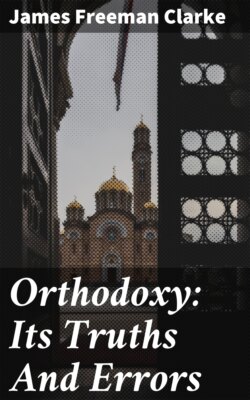Читать книгу Orthodoxy: Its Truths And Errors - James Freeman Clarke - Страница 11
На сайте Литреса книга снята с продажи.
§ 8. The Party of Works.
ОглавлениеTable of Contents
Two tendencies have joined in teaching salvation by works, or, more strictly, in teaching the initiative of the will in religion. These are the Church-tendency and the Moral-tendency in Christianity. The Church party in Christianity teaches that the first duty towards a child is to make it a member of the Christian Church by baptism, and that the first duty of every baptized person is to obey the commands of the Church. The Church thus becomes a school, in which baptized persons are educated as Christians. The Church of Rome, and the High Church party in the Church of England and in the Episcopal Church of the United States, teach this doctrine of salvation by works. This system by no means dispenses with Christian belief or Christian feeling, but makes them both subordinate. The Church says to its faithful, We do not require you to believe or to feel, but to obey. If we said, “Believe,” or “Feel,” you might justly reply, “We cannot believe or feel when we choose, and you have therefore no right to ask us to do so.” Therefore the Church only demands obedience, which it is in the power of all to render. It, indeed, requires an assent to its creed, and forbids heresy. But this only means, “Receive the creed as true until you are able to see how it is true.” The Church also insists greatly on love, and its saints have been filled with the highest raptures of piety. But it never requires feeling. It says, “Use the means we put into your hands, and feeling will come. Pray, as we command you to do, whether you feel deeply or not. Feeling will come by and by.” Discipline, therefore, and not illumination, has been the method of the Church of Rome, and is also the method of all other Churches, so far as they are ecclesiastical Churches. All such Churches teach that by a faithful conformity to their ritual, methods, sacraments, services, discipline, the Christian life will surely [pg 029] come. The one thing needful and primary with them all is obedience, and the result of obedience is knowledge and love.
Essentially the same view is taken by the Ethical party, or Moralists, in Christianity. Their statement, also, of the foundation of religion is, that it lies in obedience. They differ only from the Church party as regards the authority to be obeyed. With them it is not the Church, but the Moral Law, as made known to men in revelation, or in the natural instincts of conscience. The foundation of all goodness and religion is right doing. This leads to right thinking and right feeling; or, when it does not lead to these, it is still sufficient, and is satisfactory to God. “What doth the Lord require of thee,” say they, “but to do justly, and love mercy, and walk humbly with thy God?” At this point the extremes meet, and the Roman Catholic Church, or the extreme right, offers its hand to the Liberal Christians, or the extreme left. This is the point of contact between the two, which sometimes, also, becomes a bridge by which proselytes pass either way, from one to the other. But the practical question is, Is this answer sound? Does the will lead the way in religion? Is obedience the first step to be taken at every point of the way? Is the initiative in the religious life always an action? Are we saved by works?
The objection to this view is, that a religious action, without a religious thought and a religious affection behind it, is not in any sense religious. It has in it nothing of the essence of religion. Religion, regarded merely as obedience to God, implies the knowledge of God. We must know God in order to obey him; we must know God in order to love him. Knowledge, therefore, must precede obedience, and not the contrary. Otherwise obedience is an empty form, having no religious character. Unless we see the truth and justice of obedience, we are only yielding to human persuasion, to human authority, and not to the authority of God. It may [pg 030] be well, or it may be ill, to yield to such human authority; but there is no religion in it, or only a religion of dead works.
